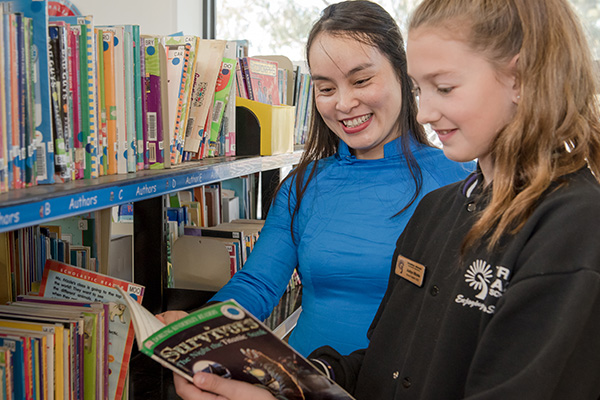by
User Not Found
| Apr 22, 2020
Marian Le Bas, Senior Program Coordinator, Asia Education Foundation
Brendan Hitchens, Program Coordinator, Asia Education Foundation

To mark International Day for the Elimination of Racial Discrimination on 21 March, Asia Education Foundation in partnership with the Immigration Museum hosted a teacher professional development session on Twitter.
Linking educators and authors from countries including Indonesia, Canada, the US, Italy and England, participants discussed ‘Intercultural Capabilities and Cultural Diversity in the Curriculum’, with a particular focus on literature and classroom texts.
What was overwhelmingly evident from this conversation was that even though physical and metaphorical borders are in place, literature enhances our connectivity and desire to learn about each other and the world. As Arnold Zable writes in the collection of memoirs, Joyful Strains Making Australia Home, “good writing transports us across borders and cultures. In sharing our tales, we come to recognize both our differences and what unites us. There cannot be one without the other”.
Responding to the prompts “Who writes the stories?”, “Who benefits from the stories?”, and “Who is missing from the stories?”, participants from both Primary and Secondary sectors offered their reflections on cultural diversity in classroom materials and texts.
While we are immersed in the COVID-19 crisis, as educators it is important for us to provide a means for the students in our care to understand this reality and its impact on peoples of all cultures. The breadth of texts that participants offered provide conduits to navigate potentially heightened racial and cultural tensions in our society.
These texts are also prompts for considering how our society can emerge from a time of profound change. How will societies be transformed? How do we equip young people to be resilient in this ‘new normal’? And, most pressing, how do we ensure that young people have empathy with their neighbours both in the local and global contexts?
The sample of texts below provides a means to address these issues. Please see the extended list here. The chat remains ongoing - you can contribute anytime at #AEFchat on Twitter.

Holden Sheppard recommended, Wave After Wave, a collection of poetry and short stories developed by ten emerging writers of Indian Ocean heritage and Meet Me At The Intersection, a collection of short fiction, memoirs and poetry by authors who are First Nations, People of Colour, LGBTIQA+ or living with disability.

Magabala Books, Australia’s leading Indigenous publishing house, recommended Alfred's War by Rachel Bin Salleh and Samantha Fry, which was recently shortlisted for the NSW Premier’s Literary Awards Indigenous Writer's Prize. The book, aimed at primary aged students, powerfully unmasks the lack of recognition given to Australian Indigenous Servicemen who returned from WWI.

Gabrielle Wang, a children’s author and illustrator born in Melbourne and of Chinese heritage. Her novels help foster intercultural dialogue (cross cultural issues, belonging and finding your place in the world) amongst primary school students: The Garden of Empress Cassia, The Hidden Monastery, A Ghost in My Suitcase, The Pearl of Tiger Bay and The Lion Drummer.

Corey Tutt, NSW ‘Young Person of the year’ for his work to provide books and scientific resources to remote schools, put forward the science themed books Australia’s First Naturalists by Penny Olsen and Lynette Russell and Australian Sea Life by Matt Chun. Corey, a Kamilaroi man, founded Deadly Science to promote STEM subjects among Aboriginal and Torres Strait Islander communities and connect students with mentors.

Living in Luca, Italy, Debra Rader is an educator, author and consultant who in 2018 released, Teaching and Learning for Intercultural Understanding: Engaging Young Minds and Hearts. She recommended The Other Side by Jacqueline Woodson, describing it as ”a beautiful book to address racism and friendship”.

Rebecca Wells, an Assistant Principal in Melbourne and former Japanese teacher. Every year she reads My Hiroshima by Japanese-Australian Junko Morimoto to upper Primary students. “It is old [published in 1987] and challenging, but scaffolded carefully” - making it accessible and “very powerful” for all ages.

Justine Poidevin, an educator from Wollongong, NSW, recommended Jasper Jones by Craig Silvey. “The book has been described as the Australian version of To Kill A Mockingbird”. It is a powerful book on racism and scapegoating, innocence and understanding, and courage and determination.

Bram Presser’s debut novel, The Book Of Dirt won him several awards across the world, including the NSW Premier's Literary Prize and National Jewish Book Awards, Goldberg Prize in the United States. Bram says, “for me the go to is Arnold Zable, who is the finest chronicler of the Jewish immigrant experience in Australia. His 2001 novel Cafe Scheherazade has just come out as a Text Classic and it's amazing. But all of his books are outstanding.” He also recommends Invented Lives by Andrea Goldsmith, The Writing on the Wall by Juliet Rieden, A Universe of Sufficient Size by Miriam Sved and I Am Change by Suzy Zail.
Read more about the event here.
Think we've missed a book or film? Share your suggestions with #AEFchat or email them to Ms Marian Le Bas.